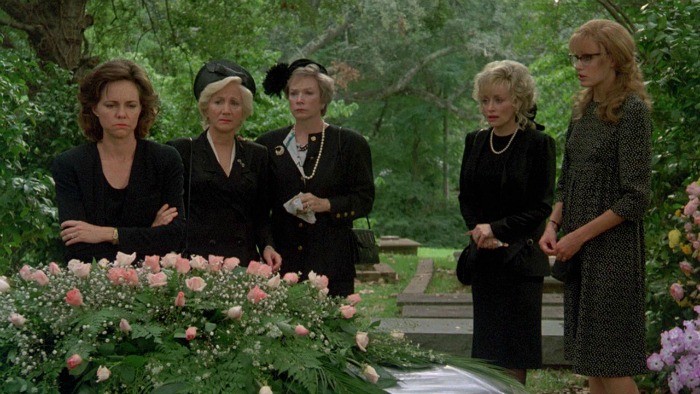Steel Magnolias (1989) is a movie about six women of varying ages in a small parish in Louisiana. We see glimpses of their lives and friendship over several years through times of joy and suffering. It is especially the story of M’Lynn Eatenton, Sally Field’s character, and her daughter Shelby (Julia Roberts) who is planning her (very pink) wedding. We get to know the women as they get their hair done and discuss life at the beauty shop owned by Truvy Jones (Dolly Parton). There they meet Truvy’s enthusiastic new-hire stylist, Annelle Desoto (Daryl Hannah). Rounding out the sextet is the rich but sour-tempered Ouiser (pronounced Weezer) Boudreaux, played by Shirley MacLaine. Her nemesis is a cheerful widow, Clairee Belcher (Olympia Dukakis), who won’t let Ouiser get by with her typical grouchiness without a clever putdown.
The barbs and one-liners fly fast and furious, slathered on with contrived Southern accents that only occasionally are wearing to Southern ears. The screenplay has clever dialog with lines throughout such as, Clairee: “The only thing that separates us from the animals is our ability to accessorize.” Truvy: “Ruth Robeline…her whole life has been an experiment in terror…first her husband was killed in WWII and then her son was killed in Vietnam… I tell you, when it comes to suffering, she’s right up there with Eliz’beth Taylor.” Clairee: “Well, you know what I always say . . . if you can’t think of anything nice to say about anybody, come sit by me.” Ouiser: “I’m not crazy . . . I’ve just been in a bad mood for the last thirty years.”
With writing like that and the good-natured jousting between women who know each other well and love each other anyway, you’re convinced this movie is a comedy. Until . . . you remember the tagline forewarned it’s “the funniest movie ever to make you cry.”
The probability of non-laughter tears soon becomes apparent. Shelby is a “brittle” diabetic with health problems that keep M’Lynn in a state of constant maternal worry. Her mother’s heart tries to elicit a promise from Shelby that she and her new husband won’t have children because she might not survive it. However, Shelby has a mind of her own, believes the risk is worth it, and at Christmas announces that she is pregnant. M’Lynn goes into worry overdrive, but Jack Jr. is born healthy and immediately has five women doting on him besides his mom.
When family and friends are celebrating Jack Jr.’s first birthday, Shelby discovers that her kidneys are failing as a result of her pregnancy. M’Lynn does all she can to save her by donating a kidney to her daughter.
SPOILER ALERT: Despite great medical care, Shelby does not survive. The scene in the cemetery near the gravesite requires a lot of Kleenex. Annelle, a new Christian, makes a common mistake, trying to comfort the grief-stricken with words—even biblical words. M’Lynn reacts as many grieving parents do. She rages against Annelle for her attempt at comfort and at God for not preventing the death of her daughter. The five women rally around to support her, and the last scene shows a later, happier time for all of them.

M’Lynn’s suffering reminds me of the woman who came to Jesus because her daughter was demon possessed (Matthew 15:21-30). The gospel of Mark explains she was a Syrophoenician, a Greek born in the Syrian area of Phoenicia on the Mediterranean coast north of Israel. That means she lived in a Canaanite culture that worshiped many gods.
Demon possession was common in that day (and still is in some heavily pagan cultures). Some characteristics of demon possession are facial feature and bodily contortion, voice changes—a girl’s voice would deepen to a man’s. A totally different personality emerges, usually coarse, harsh, and swearing. Demon possession gives a person extraordinary strength and, often, the desire to attack or kill others.
This mother had watched her child being tormented with no way to stop it. Her daughter was suffering terribly, so she came to Jesus. She had nothing going for her. Satan was against her because he didn’t want her demon-possessed daughter freed. The disciples were against her (v. 23) because they didn’t want her bothering Jesus. The times and culture were against her because a decent woman didn’t approach a man in public. But she came.
She came in spite of who she was. Others, like Mary and Martha of Bethany, could come to Jesus because they were Jews and He was a friend of their family. This woman had no claim on Him of shared religion or acquaintanceship. He was a stranger to her. But she wasn’t a stranger to Him.
She came in spite of ignorance. She knew little about the Jewish religion, yet she appealed to Him as the Son of David, His messianic name. The Jewish faith wasn’t her faith, but she had heard of Jesus and the miracles He’d done. She had enough faith to believe that He could help her daughter.
She came in spite of pride. Jesus tells her (v. 26) that He had come to the children of Israel as their Messiah. He uses the picture of taking the food that was meant for your children and throwing it to the dogs. There were two types of dogs in that day—feral dogs that prowled the streets looking for food or puppies that were sometimes allowed to be in the house as playthings for children. They were allowed under the table at meals to catch the crumbs. Even though Jesus used the word for puppies when He said it wasn’t right to give the children’s bread to dogs, he could have offended her. He was testing her pride. He, being God, knew her situation. She knew that many Jews called Gentiles “dogs”—and not the puppy kind. Would she care more for her daughter than her own pride?
If she had left in a huff, calling Him a bigot or a racist, she would have never known if He could heal her daughter. Instead she turns His words into part of her appeal (v. 28): “Lord,” she replied, “even the dogs under the table eat the children’s crumbs.” She’s saying that for You to heal my daughter will take no more effort than a crumb compared to a loaf of bread.
“Woman,” Jesus said, “you have great faith. Your request is granted.” Her daughter was healed at that moment.
Where did this woman’s great faith come from? Spurgeon said that “great faith can see the sun at midnight.” Great faith hangs onto God, rather than giving up because of circumstances. Holocaust survivor Elie Wiesel wrote in one of his books that as he was standing in a line in one of Hitler’s death camps where people were being herded into “showers” that would gas them to death, he heard someone cry, “Where is God?” That cry of despair caused him to decide if God allowed that, there was no God. But others who saw the same suffering, such as the Ten Boom family who were imprisoned in Hitler’s camps for hiding Jews from Nazis, could see the sun at midnight—even there. Before Corrie Ten Boom’s sister Betsie died in Ravensbrȕck she said, “There is no pit so deep that He is not deeper still.”
In Steel Magnolias M’Lynn had a husband, but he was less effective in helping her than her women friends. Where was the Syrophoenician woman’s husband? He should have been the one to contact Jesus. In that day a man could speak with another man, but a woman had no assurance a man would speak with her. Many marriages break up when there is a seriously afflicted or dying child. Had this woman’s husband left her because of their daughter’s condition?
In her distress over her daughter this woman didn’t say, like Wiesel, “Where is God? If He would allow this, there must be no God.” She went to find God. And she found Him incarnate in Jesus Christ. This mother’s crisis drove her to Jesus Christ. Without the crises, she might never have met Him.
Have you had a crisis drive you to Christ? Have you learned—like this woman did—that in our crises (and our daily life) He is the only One totally trustworthy?
©2016 by Vicki Huffman
About Vicki Huffman
National award-winning journalist Vicki Huffman's latest book is Soon to Come: The Revelation of Jesus Christ. It is a verse by verse exposition of the only purely prophetical book in the New Testament. Her other five books are: The Jesus Moses Knew: How to See Christ in the Old Testament; A Secret Hope (novel); Still Looking: Finding the Peace of God in Job Loss; Plus Living: Looking for Joy in All the Right Places, and The Best of Times. All are available in print and e-book on amazon.com. Vicki is a national award-winning author who has taught the Bible for many years. She was an editor for several Christian publishing houses, including Thomas Nelson and David C. Cook Ministries.
- Web |
- More Posts(120)





